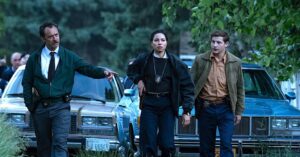Every now and then a role comes along that allows an actor to really show what they are capable of. Think of the sadly departed Heath Ledger in The Dark Knight or Sir Anthony Hopkins in The Silence Of The Lambs. That moment has now come for Bryan Cranston, a man who has shown that he has many talents in the acting game – from outrageous comedy in the hit Malcolm In The Middle through to award winning dramatic acting at its best in the cult favourite Breaking Bad. Now comes Wakefield, a dramatic film that sees Cranston at his very best – in a role that would stretch the abilities of any actor.
From director Robin Swicord (The Jane Austen Book Club, Red Coat) Wakefield sees Cranston (Argo, Drive) play Howard Wakefield, a man who feels like he is not appreciated by his beautiful wife, Diana (Jennifer Garner – Dallas Buyers Club, Juno) and their two daughters. When he arrives home late one night from work and sees his wife throwing out his dinner and not acting too ‘worried’ he decides to fake his own disappearance and watch her from the attic.
During this time Howard reflects on things like how he dishonestly gained Diana’s affections while she was actually dating his best friend Dirk Morrison (Jason O’Mara – One For The Money, Resident Evil: Extinction) while speculating what her intentions are with their handsome friend and colleague, Ben Jacobs (Ian Anthony Dale – The Hangover, The Bucket List) and also the plotting that is going on between her and her mother, Babs (Beverley D’Angelo – American History X, National Lampoon’s Christmas Vacation).
While the film doesn’t strive to be an intense thriller there is an air of suspense that remains throughout the film. Robin Swicord’s screenplay does leave the audience asking a lot of questions throughout the film which only enhances that suspense. While the synopsis of the film reads that these events follow from Howard having a nervous breakdown that is not always clear during the film and at times you find yourself wondering what kind of cruel husband/father could put their family through such a psychological game. That is only enhanced when you see what Howard was willing to do his best friend Dirk in order to win the affection of Diana.
To Swicord’s credit though she allows her audience to never truly hate Howard as she also shows his softer side by befriending the disabled teenagers from next door, Emily (Pippa Bennet-Warner – Harlots, Sick Note) and Herbert (Isaac Leyva – Any Day Now), when they seem to be shunned by the rest of the neighbourhood. The screenplay also allows a great insight into Howard’s mind with some well written, a never boring, monologues which are delivered throughout the film and by the time Howard’s stay in the attic hits winter and has a negative effect on his health we know that there is something seriously wrong with the man.
What sets Wakefield apart from the similar story in the great Australian film Tom White is the style. Swicord takes some pretty big risks in Wakefield, and luckily they all work. Having a lot of voiceover and monologues in a film has the real risk of boring the audience but that is never the case here and instead they become an impressive way for Howard to voice his thoughts to the audience. Likewise the fact that we see everything from Howard’s point-of-view, we rarely hear what Diana is saying to anyone throughout the film, gives a real one-sided view of events that only enhances how the audience warms to Howard despite his actions. Then of course there is the constant suspense throughout the film as the audience wonders what is going to happen when (if) Diana ever learns that Howard is living in the attic.
The great screenplay also allows for a brilliant acting performance from Bryan Cranston. Despite the prescience of Jennifer Garner and the occasional other actor in scenes this very much feels like a one-man movie. Cranston delivers monologues like a seasoned theatre actor while he uses body language and facial expressions amazingly well during scenes where Howard is all alone. The biggest battle for Cranston in this film is to make Howard likable to an audience where they are plainly seeing him psychologically torturing his family, and to his credit he does that remarkably well. This is an acting performance that deserves to be considered ‘one for the ages.’
The stylistic approach of Wakefield might mean this is a film not enjoyed by everybody but if you are a serious film lover who likes a good character driven film then this may well be a film that you will enjoy. An intriguing screenplay is only made better by a performance that shows the world just what a great talent Bryan Cranston really is.







